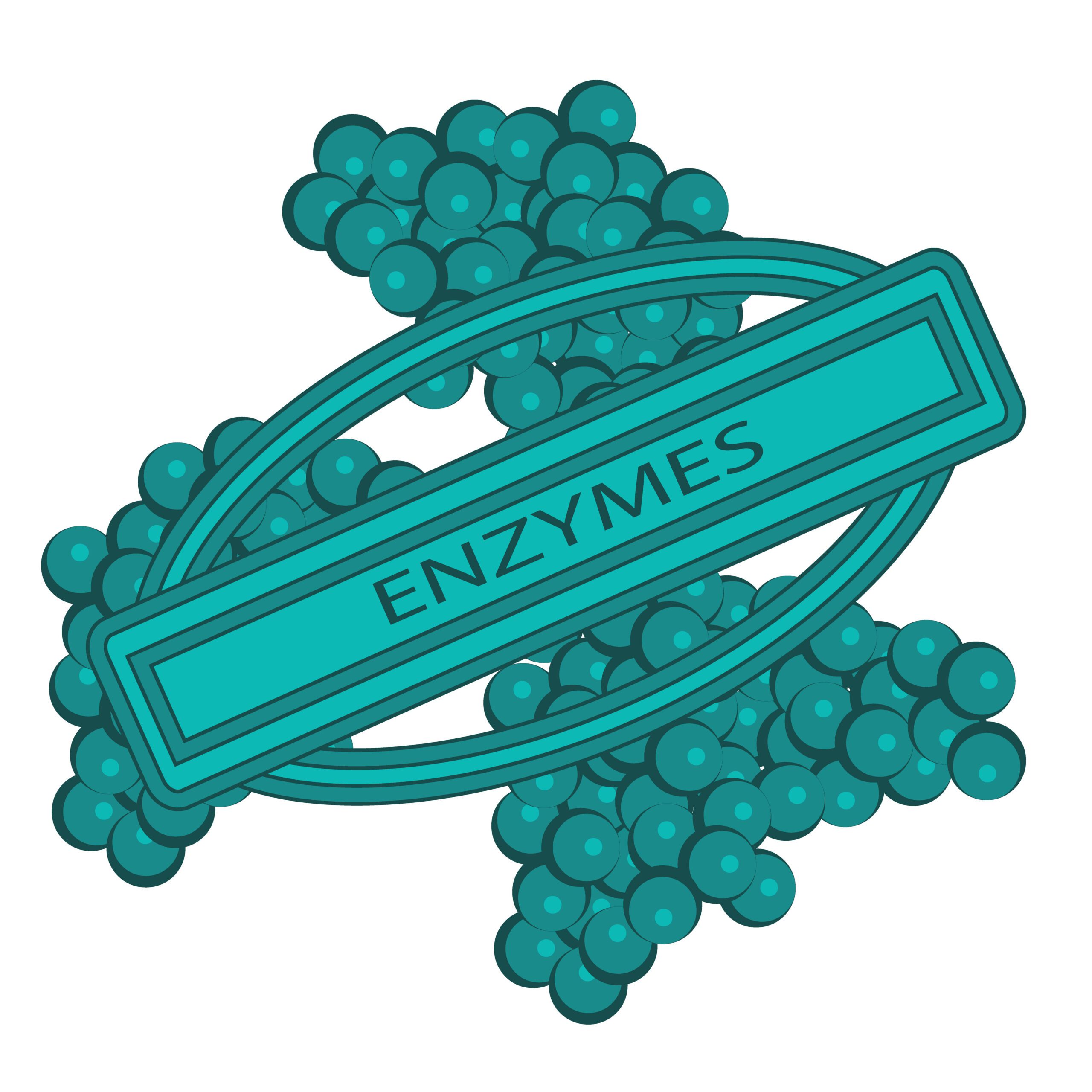
Enzyme supplements are on the rise! By popular demand, they are helping supplement companies stay afloat in a stagnant economy. In fact, growth has been trending since 2013. Some health companies have even doubled the rate of enzymes sales and projects the growth to top out at 6.3 percent by the end of 2016.
Healthcare reform has been driving the demand for enzymes as the rising cost of wellness dramatically increases. It seems that consumers are taking more control of caring for their health and opting for nutritional support, and rightfully so!
Enzymes are essential biological catalysts for every chemical reaction in your body, including normal activity of your cells, tissues, organs, and fluids. They control the speed of chemical reactions in your body. Without them, these reactions would occur too slowly to keep you alive. Vitamins, minerals, and hormones all depend on enzymes. Following are just some of the benefits you get from enzymes:
Because enzymes reside in nearly every cell of your body, they also help those cells communicate with one another while controlling growth, life, and death. It’s no wonder enzymes are flying off the shelf!
Where Enzymes Come From
Nutrition plays an important role in most enzymatic reactions. Enzymes determine the difference between a naturally nutritious live food and a dead processed food. Unfortunately, the majority of pre-packaged and processed foods removes enzymes and replaces them with man-made chemical additives for longer shelf wear. When the food’s enzymes have been removed, they are no longer nutritious or live.
Enzymes, like the ones in your digestive tract, help break down the food you eat into smaller compounds. This allows the nutrients in the foods to be absorbed into your bloodstream for health. Eating nutritious wholefoods will allow your body to do its magic.
Promising Enzyme Future for Health-Specific Therapies
While digestive enzymes have been consumed for year, more clinical studies are needed on enzymes for specific conditions and research is showing promise. However, recent studies have shown great promise that there will be a cure for this health conditions very soon.
Gluten Sensitivity
More than any time in history, consumers are eliminating gluten (a protein) from their diets. Gluten is found in wheat, barley, and rye. Over the last several decades, farmers have become increasingly aggressive in treating their crops with pesticides which alter the genetic makeup of these plants. Additionally, they have purposefully modified the genes in plants to be hardier. Unfortunately, the genetic modification of these plants has resulted in gluten that is intolerable to human digestion. People with gluten sensitivities must avoid certain foods due to their sensitivities to them. A recent study in April 2015 reported in The American Journal of Gastroenterology showed a promising enzyme (Pseudolysin) cleaving gluten effectively and is a highly therapeutic potential for Celiac Disease.[i]
Lactose Intolerance
Nearly 65 percent of the human population, and 90 percent of adults in many eastern Asian communities, has an inability to fully digest lactose .[ii]A recent study in Clinical Nutrition demonstrated that Lactase enzymes showed positive effects towards lactose intolerance when combined with freeze-dried yogurt cultures. Keep watch for new updates for what’s to come!
Blood Flow
Early in 2015, the enzyme Nattokinase showed effectiveness in treating thrombus-related diseases such as blood clots.[iii] Another recent study reported positive effects with Nattokinase on cerebral ischemia (a condition where the brain doesn’t receive enough blood flow).[iv] Overall, studies have reported Nattokinase to be an effective treatment for blood flow.[v]
Type 2 Diabetes
The enzyme Transglucosidase shows promising effects on Type 2 Diabetes. Studies resulted in lower blood insulin levels and metabolic improvements. It even improved cardiovascular risks that are associated with Type 2 Diabetes.[vi] One study even reported that Transglucosidase prevented weight gain.[vii]
Summary
While research is still determining which enzymes are needed for special health conditions, digestive enzymes have been consumed for decades. If you need enzyme supplementation, just make sure it is a complete food grade multi- complex composed of plant-based enzymes. A broad-spectrum formula is critically important to help your body digest, assimilate, and absorb the foods you eat.
[i] Wei, G., Tian, N. & Valery, A., et al. (2015, April 21). Identification of Pseudolysin (IasB) as an Aciduric Gluten-Degrading Enzyme with High Therapeutic Potential for Celiac Disease. The American Journal of Gastroenterology. doi: 10.1038/ajg.2015.97. Retrieved from
https://www.nature.com/ajg/journal/vaop/ncurrent/full/ajg201597a.html.
[ii] Genetics Home Reference. (2010, May). Lactose Intolerance. Retrieved from.
[iii] Wei, X., Zhou, Y. & Chen, J., et al. (2015, February). Efficient Expression of Nattokinase in Bacillus Iicheniformis: Host Strain Construction and Signal Peptide Optimization. Industrial Microbiology & Biotechnology, 42(2), 287-295. Retrieved from https://link.springer.com/article/10.1007%2Fs10295-014-1559-4.
[iv] Ji, H., Yu, L. & Liu, K., et al. (2014, December). Mechanisms of Nattokinase in Protection of Cerebral Ischemia. European Journal of Pharmacology, 745, 144-151. doi: 10.1016/j.ejphar.2014.10.024. Retrieved from https://www.sciencedirect.com/science/article/pii/S0014299914007316.
[v] Jang, J., Kim, T. & Cai, J., et al. (2013, December). Nattokinase Improves Blood Flow by Inhibiting Platelet Aggregation and Thrombus Formation. Laboratory Animal Research, 29(4), 221-225. doi: 10.5625/lar.2013.29.4.221. Retrieved from https://www.ncbi.nlm.nih.gov/pmc/articles/PMC3879341/.
[vi] Sasaki, M., Imaeda, K. & Okayma, N., et al. (2012, April). Effects of Transglucosidase on Diabetes, Cardiovascular Risk Factors and Hepatic Biomarkers in Patients with Type 2 Diabetes: 12-Week, Randomized, Double-Blind, Placebo-Controlled Trial. Diabetes, Obesity and Metabolism, 14(4), 379-382. Retrieved from https://onlinelibrary.wiley.com/doi/10.1111/j.1463-1326.2011.01539.x/abstract.
[vii] Sasaki, M., Ogasawara, N. & Funaki, Y., et al. (2013, May 8). Transglucosidase Improves the Gut Microbiota Profile of Type 2 Diabetes Mellitus Patients: A Randomized Double-Blind, Placebo-Controlled Study. BMC Gastroenterology, 13, 81. doi: 10.1186/1471-230X-13-81. Retrieved from https://www.ncbi.nlm.nih.gov/pmc/articles/PMC3658914/


Nanoplastics are extremely small plastic particles that range in size from 1 to 1000 nanometers (nm) To put this in perspective, they are much smaller than microplastics, which are typically less than 5 millimeters in size. Nanoplastics are so tiny that they are invisible to the naked eye and even under a simple microscope These […]


What is NAD? NAD, short for nicotinamide adenine dinucleotide, is a vital molecule found in every cell of your body, playing a key role in energy production, DNA repair, and overall cellular health. Often referred to as the “powerhouse molecule,” NAD levels naturally decline with age, leading to decreased energy, slower metabolism, and accelerated aging. […]


In recent years, the quality and authenticity of olive oil have come under scrutiny, with shocking revelations about widespread fraud in the industry. A groundbreaking episode of the popular news program “60 Minutes” shed light on this issue, exposing a disturbing trend of adulteration in many well-known olive oil brands The “60 Minutes” Investigation The […]